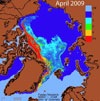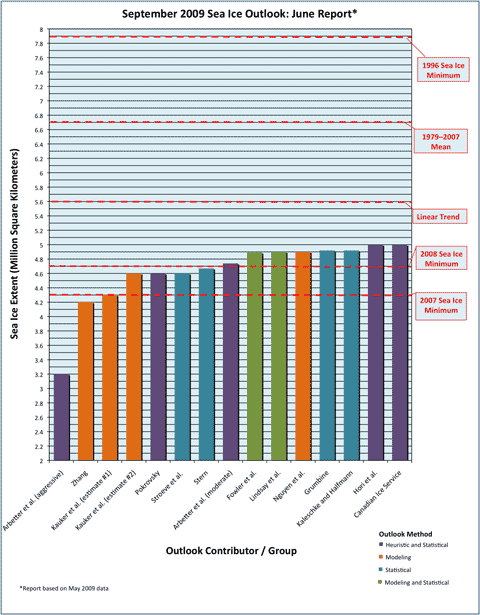 The June Sea Ice Outlook forecasts for the Arctic sea ice September minimum extent have been released today by SEARCH. Most groups are picking a minimum close to last year’s 4.7m km2, but the melt season is starting with an unusually small amount of multi-year ice. The report suggests that there is “a small but important probability of a major sea ice loss event this year, given that the ice is thinner and younger than previous years, combined with a possibility of atmospheric conditions that cause significant ice retreat.” The full range of forecasts is shown in this chart:
The June Sea Ice Outlook forecasts for the Arctic sea ice September minimum extent have been released today by SEARCH. Most groups are picking a minimum close to last year’s 4.7m km2, but the melt season is starting with an unusually small amount of multi-year ice. The report suggests that there is “a small but important probability of a major sea ice loss event this year, given that the ice is thinner and younger than previous years, combined with a possibility of atmospheric conditions that cause significant ice retreat.” The full range of forecasts is shown in this chart:

The range of individual outlook values is from 4.2 to 5.0 million square kilometers. All estimates are well below the 1979–2007 September climatological mean value of 6.7 million square kilometers. Half of the responses are in the range of 4.9–5.0 million square kilometers; the remaining estimates are in the range of 4.2–4.7 (Figure 1, above). The uncertainty / error values, from those groups that provided them, are close to 0.5 million square kilometers, thus many of the values overlap.
Interestingly, the forecasts showing the lowest minima are based on sea ice modelling driven by atmospheric forcings and initialised with current sea ice conditions. The projection by Jinlun Zhang (next to lowest in the chart) suggests that even with conditions like last year — that is, without the Transpolar Express of warm southerlies that set up in 2007 — the 2007 record could fall. On the other hand, a Russian scientist suggest thats Pacific sea surface temps could be priming a cooler pattern than last year.
The full report [PDF] is a very interesting read for all ice watchers (and gamblers). On this guide to the form, it looks as though I’ll lose my bets – but the weather over the next two months will be the deciding factor. Do I feel lucky…?

But where is the NZ C”S”C forecast?
Allow me……..
“We, the ‘scientists’ of the NZC’S’C acknowledge the significant uncertainties in such predictions and hence predict with some conservatism that this years minimum will fall somewhere between 6.7Mkm^2 and (considering that the world has been cooling for a decade) 9Mkm^2. And, in the event that the ice extent does somehow slip below our anticipated minima, we reserve the right to re-assess the ‘minima’ in November, or December, or whenever it happens to suit our ‘scientific’ argument.”
I think you might win the sea ice bet this year Gareth. People keep talking about unusual cold weather, but I can’t help thinking that it might be air masses breaking up over the poles and moving south/north. The Arctic sea is trending well down despite this ‘unusual’ cold weather, so that certainly doesn’t stack up with a cooling meme. So on top of the last two seasons’ melts, I think this one could be a doozy.
And actually, I don’t think the forecasters really know very much. I expect that the forecasts are based on models developed under relatively unchanging conditions. I don’t expect they’ll be very useful when the climate is in a state of flux.
Hi Vi,
Welcome back!
Extent at IJIS is tracking down the same trajectory as last year, and NSIDC still has their measure slightly above 2007. Still too early to call… Can’t see much in the maps at CT and Bremen either, though there might be a hint of melt beginning to accelerate across large areas, and it is getting pretty warm around the edges. (Explore that linked site for more – they have a very good map with links to weather reports).
I don’t think you can generalise too much about the state of sea ice modelling from the current batch of forecasts. In general, although the AR4 projections don’t get the near term nature of ice loss (probably because they’re not getting all the terms in the Arctic heat budget right), they do show periods of rapid loss that look like current events. They might be getting the dynamics right, at least. And, as I said, it’s interesting to note that the two lowest forecasts come from physical (not statistical) models…
Your thoughts about the weather are also interesting, because I’ve been thinking along similar lines. I need to talk to a few people before I say more, however. Worth remembering that climate change will be expressed through changes in weather, especially when rapid…